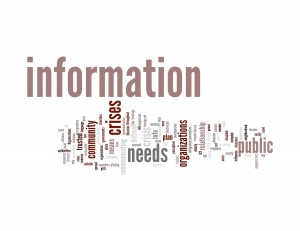Posted by emCOMP Lab
on January 12, 2015
News /
Comments Off on Meeting information needs after the 2014 Oso Mudslide

To respond and recover from emergencies people need all sorts of information. To get it, people may turn to official sources, news outlets, volunteer organizations or other members of the public. They might get it through word-of-mouth, social media, or any number of other platforms. The combination of information resources and communication platforms is different for each crisis. Each one has a unique information footprint.
In this study, we’re looking at the information footprint of the 2014 Oso Mudslide. We want to understand how the public got the information they needed; who produced that information; and how they generated and distributed it.
Study Participation
Interviewees
We are looking for people to interview who shared information with the public after the 2014 Oso Mudslide. Anyone over 18 who either shared information publicly (e.g. through an article, blog, Facebook post or tweet) or contributed in some way to an information resource may be considered.
Benefits
A better understanding of how information needs were met during the 2014 Oso Mudslide may inform interventions in future events.
Logistics
Interviews will last about 60 to 90 minutes, and up to three researchers will be present. For participants located in the greater Seattle area, we will travel to the participant’s location to conduct the interview. For those located outside of driving distance, screencast options to conduct the interview are also available. If permitted, we may ask to see the participant’s workspace and tools they used to share information about the mudslide. (Workspace pictures might be taken with consent).
Contact Information
For more information about the project and/or to participate in the study please contact:
Dharma Dailey: ddailey@uw.edu
Posted by emCOMP Lab
on October 20, 2014
News /
Comments Off on Researchers look to flag false rumors on Twitter during breaking news events
Twitter was both a useful and detrimental tool during the 2013 Boston Marathon bombings. While the service helped people find out information faster than any other medium, there was also a bevy of content shared in tweets that was flat out wrong and misinformed. A team of researchers from the University of Washington wants to develop a tool that may not necessarily tell us when tweets are bogus, but rather flag specific tweets in real time that are being questioned as untrue.
Soper, T. March 18, 2014. “Researchers look to flag false rumors on Twitter during breaking news events.” GeekWire.
Posted by emCOMP Lab
on October 01, 2014
News /
Comments Off on Current Issues in HCDE: Rumoring on Social Media after Disaster Events with Kate Starbird
Mary Gates Hall (MGH), room 241
UW Seattle campus
|
Watch the video
Social media use is becoming an established feature of disaster response. People, including emergency responders and affected individuals, are increasingly turning to available platforms to seek and share information during major events like natural disasters, extreme weather events and political uprisings. These new information-sharing behaviors are accompanied by new opportunities for disaster response, as well as new challenges, including the rapid spread of misinformation. This talk provides some background on crisis informatics, an emerging field of research that examines information communication technology (ICT) use during disaster events, and then shifts to focus specifically on how rumors spread online after disaster events—and how the online crowd “works” to challenge and correct misinformation.
About the Speaker
Kate Starbird is an Assistant Professor in the Department of Human Centered Design & Engineering and Director of the Emerging Capacities of Mass Participation Laboratory. The emCOMP Lab examines the dynamics of and applications for massive interaction facilitated by social media and other online platforms. The lab also considers how connected, collective intelligence manifests and can be supported within contexts of emergency and humanitarian response, political disruption, and other events of large-scale interest. Starbird received her PhD in 2012 from the University of Colorado, Boulder. Among her accomplishments, Starbird co-created “Tweak the Tweet,” utilizing the Twitter platform as a two-way communication method to get on-the-ground help where it is most needed. This was first deployed just in time for the Haiti earthquake disaster. Starbird is the Principal Investigator (PI) for a National Science Foundation (NSF) two-year grant for the project, “Detecting Misinformation Flows in Social Media Spaces During Crisis Events.”
See the Speaker Series lineup at hcde.uw.edu/current-issues-in-hcde
|



